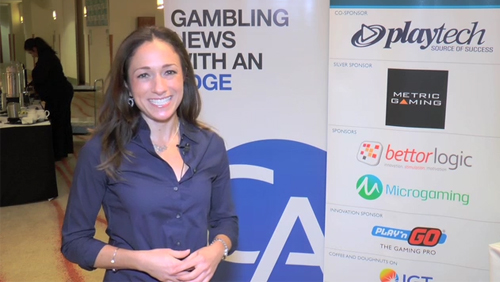The second day of the Mobile & Tablet Gambling Summit was just as busy as the first day and delegates returned to the Victoria Park Plaza in London to learn from a series of sessions touching on mobile gambling tech, advertising and strategies.
Richard Downey, Director of The Mobile House, talked on using trackable and optimisable TV advertising to drive engaged and loyal users through mobile. He walked us through six of the biggest challenges operators face when looking at TV as an acquisition channel:
1)TV buying is inflexible. With a digital background, iGaming operators are used to optimization, changing campaigns around, moving budget around, etc, but TV buying will not allow for this. Plan for two months lead times at least for TV bookings and keep in mind smaller agencies are more flexible than larger, but they won’t have the top spots with top shows.
2)The pre-watershed restrictions make tactical TV buying almost impossible.
3)Small budgets & legal restrictions. Small budgets can still produce response, the key is to effectively track response.
4)Online response hard to track. This is actually less true than ever before, there are many tools available that attribute online activity to TV spots. The Mobile House uses a tool called “AdVance” and uses a listening tool called “wywy” to ensure attribution windows are correct.
5)TV agencies are not response focused. TV is generally used for branding, not response.
6)App response hard to track. Tracking the effect TV has on app response is difficult, you need an app tracking attribution SDK and tools like “AdVance” can be used to set up attribution windows.
In summary, Downey said the traditional way of buying TV advert is changing, he advised leaving the big spots to the branding campaigns, he said mobile focused TV campaigns can now be judged in mobile terms and emphasized that the solution, as always, is in the data.
Today’s “Enhancing Customer Retail Experience Through Mobile” panel featured Marcus Wareham of Chelsea Apps Factory, Simon Liss of Omnifi, James Faure of William Hill and Moderator Darion Lowenstein of Gamblit Gaming.
One of the points discussed was how do we get younger customers to engage in the retail experience? Younger customers are already familiar with mobile products, but getting them into the corner betting shop is another story.
Faure said William Hill is investing in their retail shops by making them more modern and appealing to attract a younger crowd. At William Hill, mobile and retail are actually two very complimentary channels and Wareham provided an example of a way to link digital and retail customers together: when a bet is placed in retail, offer the betslip digitally via mobile, the customer is then brought into the app and the next step is for the customer to sign up for the digital sportsbook product.
Faure said William Hill aims to give retail customers instant access to their winnings so if they are in a pub, let them buy a round with their winnings straight away. Liss’s said rather than trying to change the customer’s behavior, tap into it- make everything more convenient for them- take a physical receipt and try to integrate it.
When it comes to data, its complicated to connect retail channel data with mobile channel data, but finding a way to integrate the two could have tremendous results. Wareham used the example of betting shop employees knowing the names of the regulators, know their preferences…why not take it one step further and inform employees about their customers’ preferences before they arrive, based on their mobile activity (and vice versa).
With so much news surrounding Daily Fantasy Sports in the USA, the UK market is left wondering if the same explosion will happen on their turf. David Clifton of Clifton Davies Consultancy, also a gaming attorney, delivered a presentation on this very subject.
In the UK, the sports betting industry is established, fantasy sports are already up and running, DFS is considered gambling and therefore operators wishing to offer DFS will need a license and they will be taxed. Clifton did not sound convinced DFS will take off in UK and greater Europe, but he did say UK-facing operators are hopeful that it will.
According to Clifton, the biggest change won’t be happening in the UK, rather it will be happening in the USA. He said its possible the DFS explosion in the US will kick-start regulation of sportsbetting in general and cited the AGA’s Geoff Freeman as hopeful of the same result.
